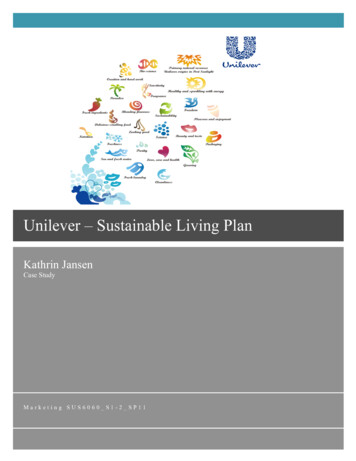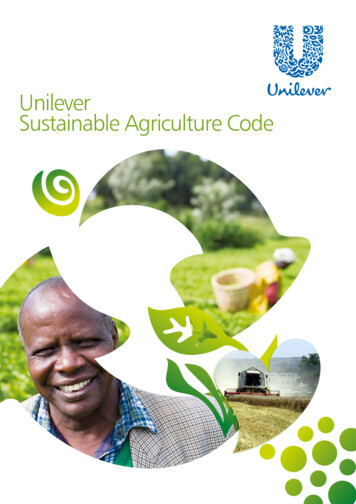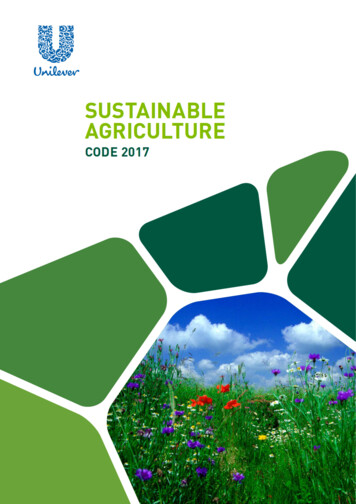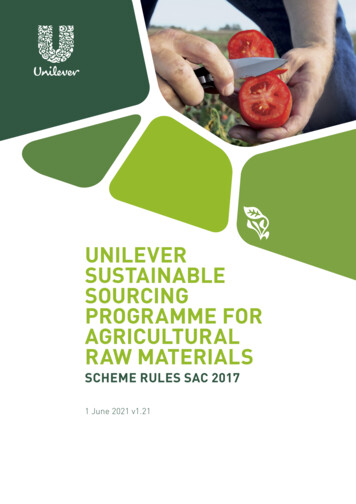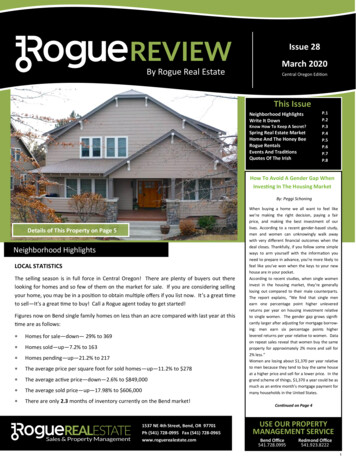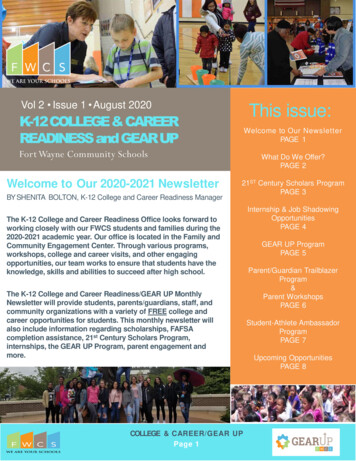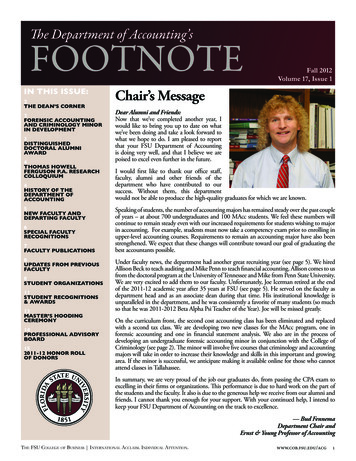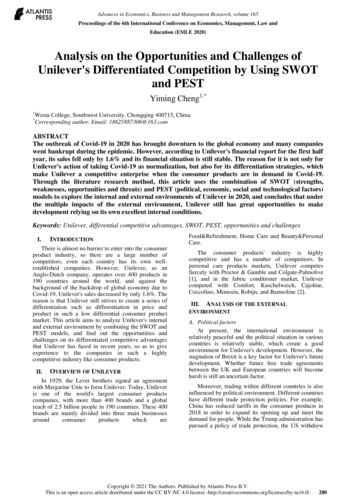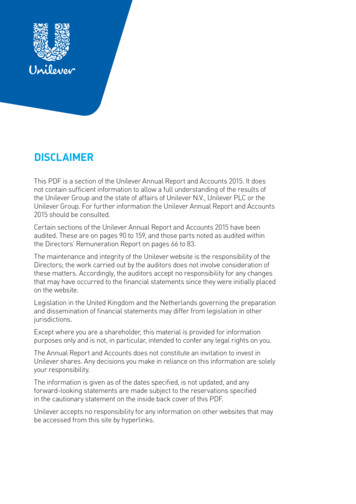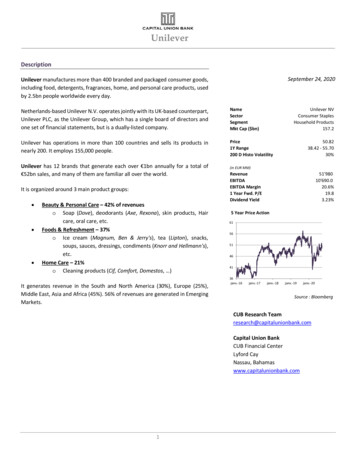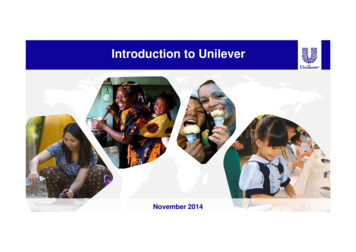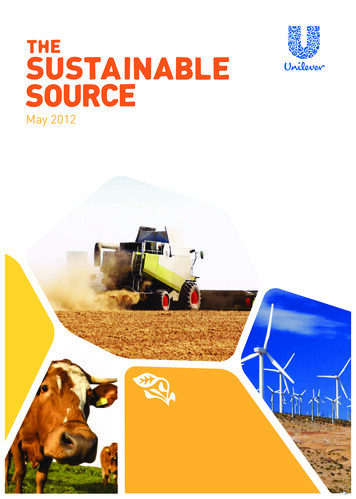
Transcription
May 2012
WELCOME TO THE MAY 2012 EDITION OFTHE SUSTAINABLE SOURCEDavid Pendlington has been with Unilever for 22 years. He spent his first 6 years inagricultural R&D for Unilever’s European frozen veg business and then moved tothe international sourcing development group. David led the first Unilever Sustainable agriculture project in 1998.In David’s current role of Unilever Procurement Operations Manager - SustainableSourcing he still works with the Global Sustainable agriculture programme, givingadvice and support to the programmes running on the ground amongst Unilever’scommodity crop suppliers.Dear SuppliersWe have had a really great year since the launch ofour Sustainable Living Plan and we are delighted toshare the highlights of our achievements with you inthe ‘Sustainable Sourcing Key Facts’ section on page3.Palm oil, tea, paper & board, cocoa and fruit & vegetables are the materials where we are making goodheadway, either through certification or self-verification. For our other key agricultural raw materialslike rapeseed, sunflower, soy, sugar and dairy, lastyear was all about working with you to find the bestindependent standards to work towards or applyour Sustainable Agriculture Code. We have learnt alot and hope to make good progress on sustainablysourcing these ingredients in 2012.In February we asked you to participate in a satisfaction survey, which has been a very useful exercisefor us. On page 4 Muddy Boots Software introducesyou to some of the changes you may have alreadyseen within Quickfire and some of the exciting newdevelopments that will be coming soon.During the last edition of this magazine we introduced you to Your Control Union and provided youwith some information about how this global consultancy and auditing organisation has been helpingus. Now, one year into our relationship with ControlUnion, they will be sharing news of their progressover the last 12 months. More information can befound on page 5.We have another four case studies in our ‘Meet aSupplier’ section on pages 6-9. Here you can learnall about other suppliers and their path to beingsustainable. Remember, if you’d like to feature in thenext edition please let us know (our contact detailscan be found on the back page).Magnum is the brand under the spotlight duringthis issue! On pages 10-11 you can read all aboutMagnum, from its humble beginnings in 1987 to itsambitious sustainability goals of today.We once again focus on one of our 11 sustainabilityindicators on page 12. This time, we’re focusing onEnergy and the exciting changes we have made tothe Cool Farm Tool.We end this edition with an article from Boris Rafalski, Unilever’s Procurement Manager for Vegetables. He talks about the importance of sustainablesourcing from a procurement perspective on pages13 and 14.I hope you enjoy this magazine.Kind regardsDavid
CONTENTS3. SUSTAINABLE SOURCING KEY FACTS4. MUDDY BOOTS UPDATE5. YOUR CONTROL UNION6. MEET A SUPPLIER - ROYAL FRIESLAND CAMPINA7. MEET A SUPPLIER - ARDO8. MEET A SUPPLIER - STEINICKE9. MEET A SUPPLIER - THE MORNING STAR PACKING COMPANY10. BRAND SPOTLIGHT - MAGNUM11. BRAND SPOTLIGHT - MAGNUM RAINFOREST ALLIANCE12. SUSTAINABILITY INDICATORS - ENERGY13 & 14. SPECIAL FEATURE - BORIS RAFALSKI PROCUREMENT
SUSTAINABLE SOURCINGKEY FACTSWE’RE ON TRACK!We reached 24% sustainable sourcing in 2011 - even better than our 20%target!Paper and BoardOUR GREATEST ACHIEVEMENTS:An estimated 60% of our paper & board was sustainably sourced in 2011.Palm OilOf the 64% certified sustainable palm oil wepurchased, most was in the form of GreenPalmcertificates. In parallel, we have made a start ondeveloping segregated streams.Tea28% of tea purchased for all brands (57% forLipton brands) was Rainforest Alliance (RA)certified.Fruit and VegetablesCocoa21% of all cocoa was sustainably sourced in 2011.We are working with RA in West Africa and after justone year more than 10,000 farmers have achievedRA certification.Dairy10% of dairy produce was sustainably sourced by theend of 2011.25% of veg & herbs was sustainably sourced.Over half our vegetable suppliers are usingQuickfire and 80 have successfully completed theself-verification process and meet our SACrequirements.Soy8% of soy oil was sourced sustainably in 2011. 4.5%is through RTRS certificates and 3.5% is certifiedagainst the ProTerra Standard.SCHEME RULESSURVEY RESULTSClick here to download theScheme Rules & determinewhether your volume ofraw materials for Unilevercan be counted asSustainably Sourced. 77% of you have received trainingin the last 12 months80% thought that the speed oftraining was good90% said it was clearOver 80% felt prepared to usethe software
MUDDY BOOTS UPDATEWHAT WE ARE DOING TO HELP YOUIt has been a year since the Unilever Sustainable AgricultureCode was launched in Quickfire and we have seen a steadymonthly increase in the volume of assessments submitted.Your 2011 assessments should all be submitted as UnderReview by now and your focus should be on completing 2011Corrective Actions in Quickfire and preparing for 2012 SACdata collection.HAVE YOUR SAY.AND HERE’S WHAT TO EXPECTIn March we asked you to participate in a surveywhich has proved to be a very useful exercise. Questions related to four main areas; Training, Support,the Assessment and The Cool Farm Tool. There aresome exciting new developments planned for 2012and the survey results (many of which can be foundin this magazine) have validated the relevance ofthese plans. We were very pleased with the number of respondents. We intend to repeat this exercise again in timeand really appreciate your feedback, which as youcan see, is driving change. HERE ARE SOME OF THE CHANGES YOUHAVE ALREADY SEEN THIS YEAR.TECHNICAL QUESTIONS Sustainably Sourced Report enhancementsUpdates to the Non-Conformance ReportNew Corrective Action Plan ReportNew Audit Guidance ReportChanges to contact functionalityImproved Report NavigationNew document storage areaUnilever Sustainable Agriculture CodeAssessment changes New Metrics ReportA range of other new Supplier focusedreportsNew Certification Filters including RedTractorContinuous usability improvements (wizards,navigations, imports)Ways to relieve audit fatigue (copyassessment, block responses)New look and improved performanceGroup webinars and video tutorialsaddressing specific areasFor technical questions related to the software andtraining, please contactsupport@muddyboots.comSURVEY RESULTSYou would like extra help with thefollowing areas: 57% Reports 53% Corrective Action ManagementWebinars and video tutorials arecoming soon to provide extratraining support
YOUR CONTROL UNIONMalea Caroline Birke is a member of your Control Union WorldGroup. In this article, Malea tells us her experience of working withone hundred strawberry packers at a factory in a small village inthe North of Morocco.FOCUS ON MOROCCOOne hundred workers are busy packing strawberriesin the Larache region of Morocco, where they growstrawberries for the European winter. Many farming families have improved their livelihoods sincestrawberry production started 25 years ago. This hasbeen very positive for the local community but theincrease in agriculture has created problems, suchas soil disinfection, high pesticide use, open irrigation in a Mediterranean climate and a decrease inwildlife.Following a three-day consultancy with one farmerand supplier, it became clear that farmers need toimprove their practices of pesticide use. Startingthis process with a company is a challenge for us,especially as we know implementing sustainablepractices will reduce production in the first instance.Once the soil fauna has recovered production willincrease again.In Morocco, the first step involved talking to highermanagement about sustainability. Then it is the localSUPPLIERMEETINGSShanghai, ChinaIstanbul, TurkeyParis, FranceDurban, South AfricaSao Paulo, BrazilBerlin, GermanyMumbai, IndiaLima, PeruKuala Lumpur, MalaysiaRome, ItalyNew Jersey, USA IIStockton, USA IRotterdam, The NL IIRotterdam, The NL IMoscow, Russiafarmers who really need to implement the project.Maybe it will include the planting of fruit trees alongthe river for them to eat, or trees to harvest woodduring the winter for their fires. Control Unionadvise suppliers on the best farming methods to introduce on their farms, but ultimately it remains anindividual journey and depends how far the supplieris willing to go.YOUR CONTROL UNION MEETINGSControl Union is conducting 16 meetings globally in 10 different languages during May andJune this year. Participation is voluntary but wehighly recommend you take part to get a goodunderstanding of what is required to achieve yoursustainable status.Topics include: The Unilever Sustainable Living Plan and therole of suppliers in delivering the sustainability targets The Sustainable Agriculture Code (SAC) thatbuilds on 11 key indicators Understanding the scheme rules Implementation process, roles and responsibilities Muddy Boots Software Toolbox – where to find help and support materials to assist you to deliver on sustainability26/27 March1 & 2 May (2 1 day events)2/3 May3/4 May7/8 May10/11 May16/17 May16/17 May21/22 May23/24 May31 May/1 June4/5 June5/6 June11/12 June14/15 June
MEET A SUPPLIERROYAL FRIESLAND CAMPINAIf you’ve ever had a Mini Milk ice-cream, you’ll know how good milk cantaste. FrieslandCampina, one of Unilever’s biggest dairy suppliers, is nowworking with Unilever to ensure that all of its dairy-based products notonly taste great, but are sustainably-sourced too.Royal FrieslandCampina is committing to fully align its farm practices withUnilever’s rigorous Sustainable Agricultural Code. They already have theirown set of 2020 sustainability objectives in place. As with Unilever,FrieslandCampina is committed to moving forward.The Unilever Sustainable Living Plan commits Unilever to source all of its agricultural raw materialssustainably by 2020. FrieslandCampina is working with Unilever to help them meet this ambitioustarget on dairy.Campina’s member farms last year. Based on itsfindings, Control Union then passed on a series ofrecommendations and improvement plans to them.These are designed to help their member farmersfully embed the Code.Andrea Toth, Procurement Operations SustainableSourcing Manager, Unilever, spells out: “We are always looking for ways of working with our suppliersto drive sustainability in our supply chain. As dairyis one of our top ten raw materials we are pleasedto work together with FrieslandCampina on sustainable dairy.”“All the recommendations will be implemented bythe end of 2012,” says Roelof Joosten, Chief Operating Officer Ingredients, member of the ExecutiveBoard of Royal FrieslandCampina. “To guaranteecontinuous improvement, the assessed farms willcarry out a self-evaluation process every year. Weare glad that at FrieslandCampina we are alreadyable to fulfil the Unilever criteria on sustainability.This is an opportunity to reduce the total eco footprint in the entire production chain”, Joosten states.As part of an initial pilot, Control Union was askedto carry out assessments at twelve of Friesland-“A lot of good work is already being done. For instance, around 130 ofFrieslandCampina’s member farmers are already producing milk organicallyor biodynamically. By adhering to the Unilever Sustainable Agriculture Code,we expect to see many more such examples between now and 2020.”Andrea Toth, Procurement Operations Sustainable Sourcing Manager, Unilever
MEETASUPPLIERARDOGrowing 40,000 hectares of vegetable crops, spread across 4,000growers in eight different European countries, Ardo is an importantproducer of frozen vegetables and a major supplier to Knorr.Committed to a path of continuous improvement insustainable agricultural production, Ardo hasembarked on an ambitious plan to reduce inputswhilst maintaining, or even improving, yields andproduct quality. Having chosen a holistic approachthat considers every element; Ardo is reviewing allaspects of crop production and is challenging triedand tested techniques with cutting edge researchand field trials.On the 6 & 7th of February 2012, Ardo invited 25 ofits Agricultural Managers to Belgium to participatein a two day internal conference on sustainability, where participants were asked to present thefindings of their on-farm research. The event wasinspirational in demonstrating concrete opportunities to reduce seed rates and to improve the efficacyof fertiliser, crop protection products and irrigationwater.In December of 2011 Ardo filled a new position inits Agricultural Department, with Eva Dekeyser(pictured above) taking on the role of Project Manager for Sustainable Agriculture.One of Eva’s key responsibilities will be managing aproject to reduce pesticide applications and the levelof detectable residues on crops grown for Knorr. Theproject, which will run over several years, is supported by the Knorr Partnership Fund and Ardo’sprogress will be reported in future issues of theUnilever Sustainable Source magazine.“Ardo has been ‘preserving the precious gifts of nature’ – the companymotto – for more than 40 years. However, the recent progress that wehave made in sustainable crop production is very exciting and has established a market for other areas of the business.”Bernard Haspeslagh, Chief Operations Officer, Ardo
MEETASUPPLIERSTEINICKESteinicke is one of Germany’s leading producers of herbs and driedvegetables, as well as a main supplier and strategic partner to major brands in Europe and across the world.Steinicke farmers provide Unilever with chives, parsley, carrots,celeriac and leeks. The company has been working hard to helpUnilever on its path to sustainability. Most recently, Steinicke hasbeen encouraging the migration of mammals, in particular endangered species that have started to appear from Poland.As one of the least populated regions in Germany,the area of Wendland where Steinicke and its farmers are located offers ideal migration routes andhabitats for endangered species such as otter, beaver, white-tailed eagle, common crane and the common wolf which has started to appear, as a result ofthe fallen border fences versus the East in 1989.The farms include many forest areas which areextensively used for forestry and farmers are beingencouraged to build nesting boxes and bird hides intheir fields. What’s more, Steinicke organises localschool groups to monitor flower stripes on unpro-ductive areas to research the fauna and flora.Crossing Steinicke’s farm lands are a big-bird habitat, wild forest and a UNESCO Biosphere Reserve. Inorder to protect these, farmers have adapted theircultivation accordingly by mowing meadows onlyonce a year, not cropping on the wetlands of riversand planting hedges. Steinicke is also supporting alocal bat conservation project.SURVEY RESULTSTraining in German (25%) &Spanish (33%) are in highestdemand. Consultants on the newControl Union helpdesk areworking with Muddy Boots toaddress this.“The demand for sustainably manufactured products increases all ofthe time. The quality of food is also becoming increasingly importantand people are beginning to demand good quality, sustainable products.Since we began in 1921, we have always considered our environmentand our cultivation philosophy and the way we manufacture our productsreflects this.”Sibylle Lettenbichler, General Manager, Steinicke
MEET A SUPPLIERTHE MORNING STARPACKING COMPANYMorning Star owns and operates three tomato processing facilities: twonear Los Banos (in the San Joaquin Valley) and the other in Williams (in theSacramento Valley). With advances such as a gravity-fed flume unloadingsystem and replacing the traditional cooling tower with a cooling pond, theCompany is staying on the forefront of food processing technology. Theseinnovations allow them to process more tomatoes in less time usingfewer resources.The Morning Star Packing Company has been involved in sustainable and environmentally sensitiveagriculture for 20 years. The most recent initiative isthe Sustainable Agriculture Programme, which applies environmental guidelines for growers to followin order to be a grower-supplier to the Morning Starenterprise. These guidelines are all aimed at ensuring that any use of fertilisers and pesticides to growthe tomato crop is utilised effectively, minimising thequantity used and helping to maintain biodiversity inthe area.Morning Star strongly encourages each growerto follow additional guidelines, such as avoidingproduction in ecologically sensitive areas, limitingerosion of nearby land, having backup plans in caseof chemical spills and closely monitoring the nearbyarea for agrochemical exposure. Morning Star iscurrently in the process of collecting the monitoringdata from each grower in order to track trends andpatterns.The Knorr Partnership Fund has, in conjunctionwith Morning Star’s farming affiliate Lucero Farms,agreed to jointly fund and develop a 35 acre sustainable demonstration farm with the help and cooperation of the Sycamore Family Trust, the University ofCalifornia at Davis and the Audubon SocietyCalifornia.The long term goals of this partnership are tofurther habitat restoration and to provide a conservation tillage demonstration farm. This will beaccomplished through the installation of dripirrigation systems and by installing owl and otherbird nesting boxes, as well as bee boxes. Covercrops will also be planted to reduce runoff.“Moving forward, we are setting very ambitious goals for ourselves andour growers in our agricultural sustainability effort to ensure that thelargest possible crop is produced using minimal resources and limitingdamage to the environment. Unilever is a major partner in driving thisdevelopment.”Karolina Splinter Young, International Sales Manager, The Morning StarPacking Company
BRANDSPOTLIGHTMAGNUMMagnum was launched in the UK in 1987 and in Ireland in 1990, making it the first widelyavailable hand held indulgence ice cream in both countries. Since then, Magnum lovers havebeen treated to an array of delicious flavours such as Double Chocolate (1996), Double Caramel (2000), Yoghurt Fresh and Magnum Intense (2002).Now into 2011, Magnum introduces the deliciously decadent Magnum Ecuador Cocoa andMagnum Ghana Cocoa made with specially selected cocoa bean from Rainforest Alliance Certified farms.BEST PRACTICE IN THE INDUSTRYMagnum believes fostering sustainable cocoa is thebest option for securing its high quality cocoa needsin the long-term. It isn’t possible to change theindustry on their own, but as a significant buyer, theyare able to apply pressure, bringing about improvements for farmers, communities and ultimately thecustomer. Magnum is proud of their work in progressing towards sustainability certification, whichplaces them in the forefront of the global ice creamindustry.RAINFOREST ALLIANCE &MAGNUM - WORKING TOGETHERFood security is under threat from rising populations, changing weather patterns, water scarcity andunsustainable farming practices. As half of Unilever’s raw materials, such as cocoa, come from farmsand forests, Unilever will focus efforts first on thoseingredients which come from agriculture.Magnum is all about pleasure and for years has offered tempting, delicious and luxurious ice creammoments. In 2011, Magnum added another layer ofpleasure to their ice cream experience by teamingup with the Rainforest Alliance.By joining forces, Magnum and the RainforestAlliance are taking great tasting ice creambeyond pleasure today and on to pleasure tomorrowfor many thousands of cocoa farmers, their familiesand the environment.For more information visitwww.facebook.com/Magnum
BRAND SPOTLIGHTMAGNUMRainforest Alliance collaboration adds another layer of pleasureto the Magnum ice-cream experienceLast year, Mangum launched two new variants madewith some of the highest quality cocoa beans, specially selected to enhance the Magnum chocolate icecream pleasure experience.These specially selected cocoa beans are carefullysourced from Rainforest Alliance Certified farmsin Ecuador and Ghana, where forests and wildlifeare conserved and farm workers are treated withrespect.Magnum Ghana, made from 36% pure cocoa fromGhana, and Magnum Ecuador, made from 62% cocoafrom Ecuador, delivers ultimate chocolate pleasurefrom bean to bite, with 100% of the beans sustainably sourced.By the end of 2012, 60% of the cocoa Magnum useacross their ice cream range will come from suchsustainable sources – such a commitment meansthat from 2015 Magnum will be buying around35,000 tonnes of cocoa from certified farms a year.This will help thousands of farmers in Ghana, Ecuador, Côte d’Ivoire and other countries in West Africato: Produce more and better cocoaRaise their incomeDeliver social benefits such as improved accessto education for their childrenProduce lasting environmental benefits whichwill help wildlife, and protect the soil and waterupon which they dependSURVEY RESULTS59% have had atechnical support issueresolved very quicklyor quickly
SUSTAINABILITY INDICATORSENERGYImproving energy efficiency and using renewable energy resources are both important for improving profitability and reducing pollution. Improved energy efficiency by our suppliers and farmers willreduce the rate of depletion of fossil fuels, and often at the same time minimise the emissions ofgreenhouse gases and other polluting gases.THE COOL FARM TOOLThe Cool Farm Tool is a new greenhouse gas calculator for farming, which was developed by theUniversity of Aberdeen in partnership with Unilever.It calculates the greenhouse gas balance of farming,including emissions from fields, inputs, livestock,land use, land use change and primary processing.It also offers users the chance to see the things thatfarmers can change to reduce their carbon footprint.The tool is being used by a number of different companies with their suppliers in 18 countries. For moreon this network please see:www.sustainablefood.org/gacahome.CHANGES ARE COMING IN 2013.We realise that the Cool Farm Tool requires a lot ofdata. Since 2011 was the first year we used it, westarted by asking suppliers to fill in the data for onefarm that they considered representative of theirgroup of farmers. However, from January 2013Question 6.3.2.1 will become a farmer question.This means that each farmer who completes aQuickfire assessment will need to work out theirown carbon footprint using the Cool Farm Tool. Thiswill help us get a better picture of what is happeningacross the farmer base, and help us work with youto reduce your carbon footprint.HELP IS AT HANDOur recent survey showed that many of you foundthe Cool Farm Tool difficult to complete. Please remember that there is a user guide online and also afactsheet available with some top tips for easy completion. You can view our Cool Farm Tool factsheet inthe Quickfire Help Area and by clicking here.CUSTOMER COLLABORATION SUPPORTSSUSTAINABLE AGRICULTUREGivaudan supplies sweet corn powder to Unilever foruse in our Knorr brand of sauces, soups and bouillons. They are now in their fourth growing seasonof reporting environmental and social data to us aspart of the Sustainable Agriculture Code.The funding has been used to establish trialgrower plots and gather baseline data. The workis still in progress but early results indicate thatsoil testing prior to nitrogen application can deliver both cost and environmental savings.Using the Cool Farm Tool, Givaudan has been able toestimate farm-level greenhouse gas emissions forsweet corn production.Vanessa King, Sustainable Sourcing Development Manager from Unilever comments: “Theproject with Givaudan shows the power of theCool Farm Tool in identifying the area of mostimpact, and helping farmers reduce their emissions. As our biggest environmental impacts arein the sourcing of agricultural raw materials,working closely with suppliers like Givaudan,who share our values and want to grow sustainable businesses with us, is vital.”The Tool revealed that the most CO₂ intensive partof sweet corn production is the application of fertiliser. Working in partnership with Unilever, Givaudantherefore jointly funded an Oregon State Universityresearch project to understand how fertiliser application might be optimised for the particular varietyof sweet corn they supply.
SPECIAL FEATUREFROM SOURCING TO SUSTAINABLESOURCINGBoris Rafalski is the ProcurementManager for Vegetables at Unilever.1. WHAT ARE THE BENEFITS OFSUSTAINABLE PROCUREMENT?For suppliers it is a unique opportunity todifferentiate their products. In addition it can helpimprove yields and reduce costs. This incentivisessuppliers to help improve farm practices. I think thatmany of our suppliers have been working for manyyears to develop sustainable practices and I feelencouraged that a big customer like Unilever putssustainability at the centre of its sourcing strategy.It’s important that a company like Unilever takesresponsibility for the environmental impact it has onthe planet. In terms of competitive advantage Ibelieve it will become one of the key success factorsto make a difference in the market place.Sustainable procurement provides an opportunity toincrease market share and strengthen brand image.It limits external risks that could damage thecompany image through ‘inheriting’ bad practices ofsuppliers. Plus it’s a driver for innovation and raisingproduction and process standards.SURVEY RESULTSTime taken to complete one farmerSAC assessment ranges from 1 - 2hours (15%), to 5 hours plus (38%).This range is to be expected as itis the first year of completion andshould reduce in future years.2. WHAT ARE THE MAIN CHALLENGES?It does require buyers and suppliers to acquire an indepth knowledge in sustainability, for suppliers tooit requires commitment and investment.Sustainability is often seen in the short term as acost. It must be seen as long term value creationfor a company and its customers. And I truly believeinvestments in sustainability will pay off in the longterm, because it will be more about quality, availability and reliability in the future not than just aboutprice.One of our key challenges is that we don’t buy directly from farmers or smallholders. We buy mostlythrough processors. So we need to influence suppliers through the value chain to ultimately benefitfarmers. That’s both a challenge and an opportunity:we’re not just focused on the requirements of Unilever but how we can move the industry forward.We source from over one million smallholders. Aspart of our Unilever Sustainable Living Plan commitment on enhancing livelihoods, we want to meaningfully engage with at least 500,000 smallholders inour supply network. This means we will help themto improve agricultural practices and enable them tobecome more competitive while improving the quality of their livelihoods.A key challenge for buyers is to become an expert inunderstanding the business case for sustainability- it’s no longer all about managing the bottom line.Buyers also need to get a good understanding on therequirements of our Sustainable Agriculture Codeand how suppliers and farmers need to apply thesestandards in the field.
3. SO HOW IS UNILEVER’S APPROACHCHANGING?4. HOW ARE SUPPLIERS REACTING TO THENEW APPROACH?We’re developing longer term relationships withsuppliers to understand the origination of rawmaterials and move towards more transparentsupply chains. By understanding who is growingour inputs we can help ensure these farmers getthe training and support they need to become moresustainable. And this can only be done through longterm supplier partnerships.Some suppliers have well established sustainability agendas whilst others may be at the start of thejourney, but overall the response is very positive. Iam overwhelmed at the commitment and investment suppliers are ready to make to join us on thisjourney.5. WHAT HAPPENS IF YOU GET TO A POINTWHERE YOU CAN’T MAKE ANY PROGRESSWITH A SUPPLIER?6. ON A PERSONAL LEVEL HOW DO YOU FEELABOUT THE SUSTAINABLE PROCUREMENTAGENDA?We are committed to 100% sustainable sourcing,so all our suppliers need to be on board. The focusfor next 3 years is to get past 50/60% - we’re at 24%today. That’s where the hard work will come: how dowe engage the remaining suppliers?I find it very exciting and see it as a very positivechange. I grew up in the countryside, studied agriculture at university and before Unilever I workedwith a farmer co-operative, so it’s a subject that isclose to my heart. More than that though I see thisis the right thing to do. We have to find more sustainable ways of living to secure resources for futuregenerations. I am proud of our contribution as acompany and hope that we can make a real difference to the farmers we work with.We will be looking to consolidate our supplier baseand working with those suppliers who share ourgoals and are committed to join us on our sustainability journey. So our supply base will reduce overtime but those suppliers who work with us will growtheir supply to us.
.your partner for goodMuddy Boots Software Ltdt: 44 (0)1989 780540www.muddyboots.comTechnical Supportt: 44 (0)1989 780540e: support@muddyboots.comAnna PowellUnilever Account Managert: 44 (0)1989 780540e: a.powell@muddyboots.com
sustainable status. Topics include: The Unilever Sustainable Living Plan and the role of suppliers in delivering the sustainabil-ity targets The Sustainable Agriculture Code (SAC) that builds on 11 key indicators Understanding the scheme rules Implementation pr
